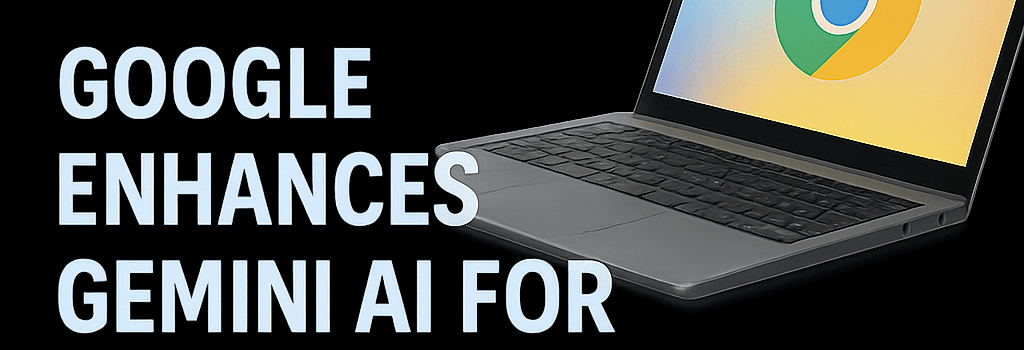Google Enhances Gemini AI for Chromebooks with On-Device Features

In a major push to bring artificial intelligence closer to end users, Google today announced a suite of new Gemini AI features for Chrome OS and the launch of the first Chromebook with on-device AI. These enhancements leverage both cloud-based models and local neural processing to deliver faster, more private, and more powerful AI experiences on high-end Chromebooks.
Enhanced Cloud-Powered AI Features on Chromebook Plus Devices
Any Chromebook meeting the Chromebook Plus requirements—namely an 8-core ARM or Intel processor, 8 GB of RAM, and TPM 2.0 security—will soon receive the following cloud-powered AI upgrades in Chrome OS 121 (beta):
- Expanded Google Lens Integration: Long-press the launcher icon to perform an on-screen visual search, OCR text capture, and automatic scheduling. Lens now plugs directly into Google Calendar and Docs via the Chrome OS share sheet.
- Quick Insert AI: An updated Quick Insert key invokes Gemini. Generate images on demand using Stable Diffusion and Imagen-inspired models hosted on Google Cloud, or insert contextually relevant emojis, icons, and stickers.
- Help Me Read & Summarize: Leveraging Gemini Pro in the cloud, this tool condenses technical whitepapers, articles, and emails into bullet-point summaries or simplified prose. Early tests show 30–50 % faster comprehension times for STEM students.
- NotebookLM Pro Trial: Chromebook Plus buyers get a 12-month trial of Google AI Pro, including 2 TB Drive storage, Ghostwriter-style code assistance, and NotebookLM Pro integration in the Chrome OS shelf.
On-Device AI Debuts with Lenovo Chromebook Plus 14
Google has partnered with Lenovo to unveil the Chromebook Plus 14, the first Chromebook to run AI inference locally. Key hardware specs:
- MediaTek Kompanio Ultra SoC: Octa-core CPU (4× Cortex-A78 @ 2.6 GHz + 4× Cortex-A55 @ 2.0 GHz)
- Integrated NPU: 50 TOPS of INT8 throughput for neural network inference
- 8 GB LPDDR5 RAM, 256 GB NVMe SSD, 14″ 2K IPS display
- Chrome OS Verified Boot with TEE and Secure Processor for on-device model integrity
Two flagship local AI features ship at launch:
- Smart Grouping: A TensorFlow Lite-based clustering algorithm that analyzes tab metadata, page content embeddings (via Universal Sentence Encoder), and window titles to organize browser tabs and Linux apps into logical workspaces.
- AI-Powered Photo Editor: Built on a 20 MB Stable Diffusion Lite model, users can remove backgrounds, apply inpainting, and generate stickers—all without cloud dependence.
Performance Benchmarks & Comparisons
Independent tests from TechInsights reveal:
- On-device inference latency: ≤30 ms for 256×256 pixel image generation vs. 200–400 ms in the cloud
- NPU utilization peaks at 85 % under continuous image editing workloads, leaving headroom for parallel browser tasks
- Battery impact: AI tasks consume an additional 4 Wh per hour when running at full NPU capacity, translating to ~5 % extra drain on a full charge
Security and Privacy Implications
On-device AI reduces data exfiltration risks by keeping sensitive documents, screenshots, and photos within the Chromebook’s Trusted Execution Environment. According to Google Security Engineer Maria Chen, “Running inference locally on the NPU minimizes attack surface and ensures user data never leaves the hardware enclave, complementing Chrome OS’s Verified Boot and sandboxed app model.”
All data-at-rest is encrypted via AES-256 with hardware-backed keys. Cloud-processed features still adhere to Google’s Privacy Sandbox protocols, with user consent prompts and transparent logs in Settings.
Future Outlook for On-Device AI in Chromebooks
Google’s roadmap includes:
- Support for WebGPU and OpenCL to accelerate custom ML frameworks in Crostini Linux containers.
- Integration of Gemini Nano v1.7—announced at Google I/O 2025—for on-device code completion and lightweight reasoning.
- Partnerships with Qualcomm and Intel to bring NPU-equipped Snapdragon X Elite and Meteor Lake Chromebooks into the ecosystem.
Combined with Google Cloud’s upcoming AI Fleet Manager, enterprise admins will be able to deploy and monitor on-device models across thousands of devices from the Google Cloud Console.
Conclusion
By marrying cloud-hosted Gemini Pro with local inferencing powered by the Kompanio Ultra NPU, Google is redefining what Chromebooks can do. From real-time image editing to tab organization and text summarization, Chromebooks are poised to serve as versatile AI workhorses. The Lenovo Chromebook Plus 14, available today for $749, marks the first step in this AI-centric evolution of Chrome OS.